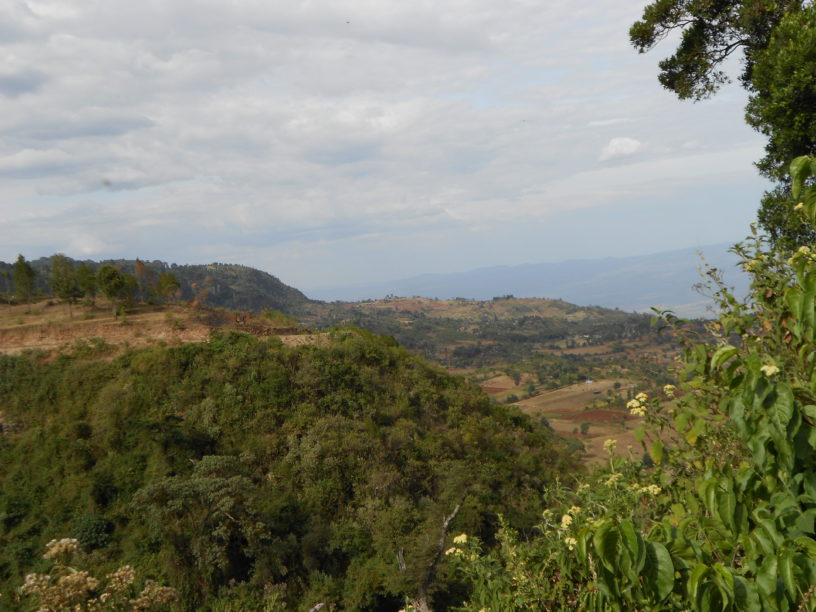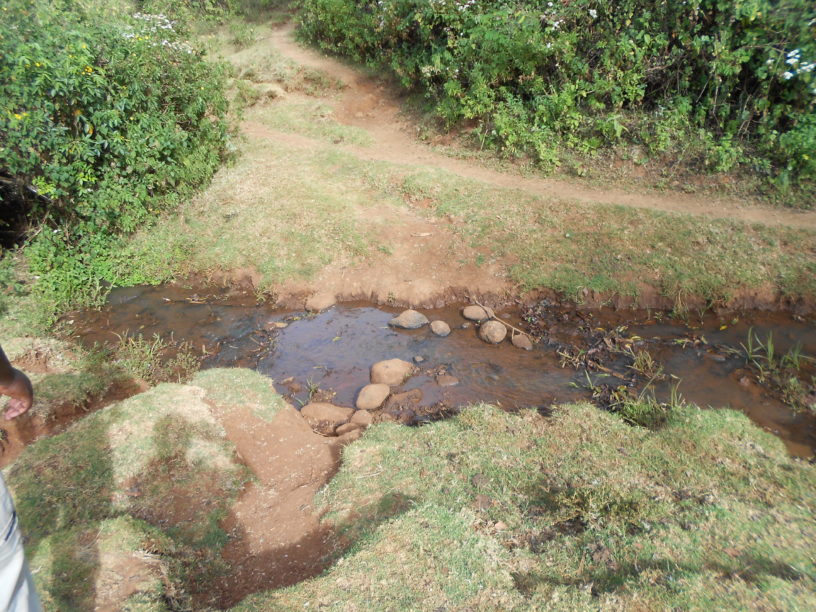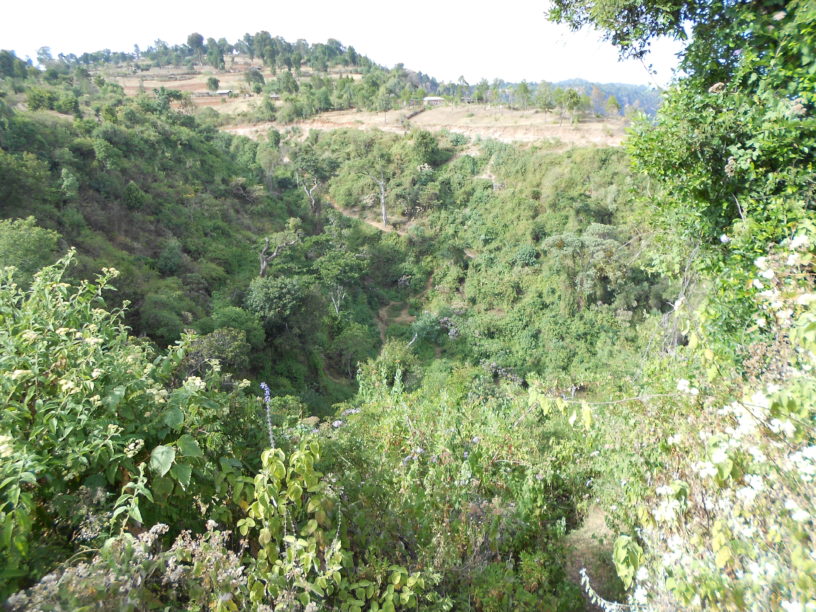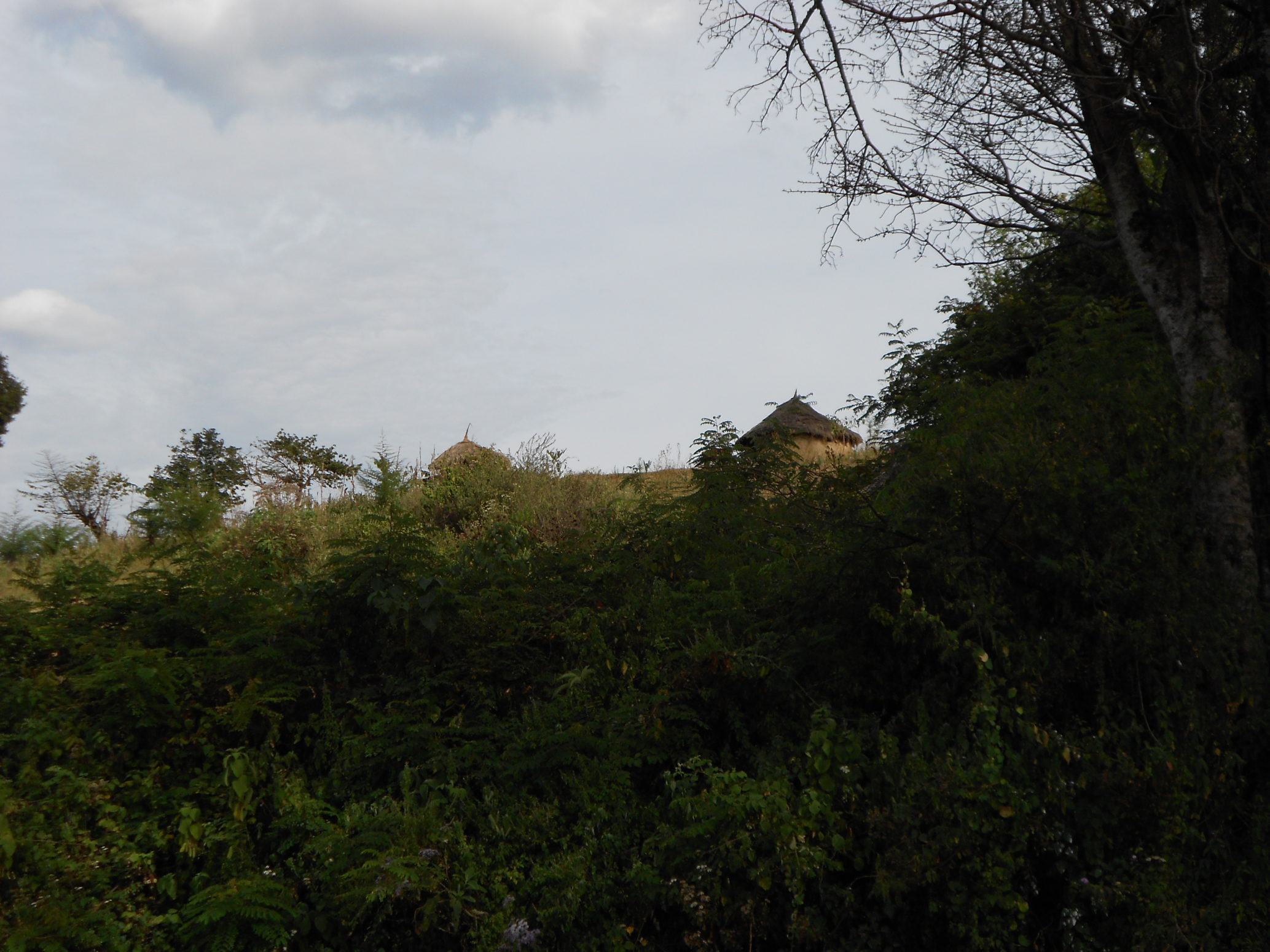When I was seven-years-old, I wished Kapsio could just be the forest it once was, sheltering elephants, baboons, leopards, warthogs, and other animals. Anything but us.
I was embarrassed to live in a place renowned for cheap sex and chang’aa (illegally-brewed alcohol), and for the weekly raids from the police to arrest traders of these two commodities. Kapsio was a part of Iten, a tiny town which perched on the edge of the Rift Valley. Iten had a post office, a bank, a hospital, two schools—primary and secondary—and a tarmacked road; all it lacked was a fire station. It had the luxury to invest in a cabro-paved footway which was at least ten steps long and was lined on both sides by knee-high bougainvillea hedges. The Rift Valley looked best from Iten, at a spot called Viewpoint, where it showcased depths that changed colors according to the position of the sun, from dull-grey and light-blue to royal-purple. Athletes trained in Iten, where the altitude allowed them to reach peak lung performances.
Kapsio village lay low behind Iten, in a section of the land that curved like a bowl, houses and farms haphazardly thrown inside. People from other parts of Iten spoke unkindly of us; we were detritus, examples of what could go wrong with humanity when it miss-stepped. Sex workers gathered from all over the district, to live in a row of single-roomed houses constructed from corrugated-iron sheets that stood on a slope of land shielded from the sun by tall cypress trees. They sold alcohol and their bodies, and dug patches of land to grow vegetables. Most walked barefoot, and in fits of anger would tear off their tops and swing them over their heads, cursing as loudly as they could.
I remember a drunken man, once, who fell on one such woman’s vegetable garden: she shouted at him, stating that she suffered selling him her vagina in order to plant her sukuma wiki, and added that while his semen always left a bad smell on her bed, she wouldn’t tolerate him making her life more miserable by stepping on her carefully-tended crop.
These men who came to drink all looked the same: burnt pink lips, skin that had thinned and almost turned transparent, and bodies that sagged under the weight of long, brown coats that were never washed, and were crisscrossed with mud lines as thick as thumbs.
I remember an old woman who was followed everywhere by troops of dogs, which she insisted were not hers. It was said that she had bad eyes that could kill with a glance; and for this she had to spit each time she saw a baby, in order to dissolve their poison. There was also a mentally-ill family that lived in Kapsio, a mother and son who would walk holding onto each other’s clothing as mucus and saliva dribbled and marked the ground they walked on.
 (Kiprop Kimutai)
(Kiprop Kimutai)There were many “decent” folk in Kapsio: nurses, teachers, veterinary officers, shop owners and farmers. There were my parents, retired agricultural officers who planted limes, lemons, peaches, plums, tangerines, mangos, avocados, guavas, and oranges (on a farm that also reared cows, goats, chicken, sheep, and a multitude of feral cats). Still, we all got used to being derided by pastors, headmasters, and administrative officials, by anyone who had the chance to hold a microphone and speak at a public gathering. We got used to being warned to turn back to God, to let our children go to school, to stop drinking, to stop being lazy and work hard as everyone else, to stop being an embarrassment.
But people…we worked hard. I would wake up in April to find teams of men driving oxen across fields, furrowing it deep in order to plant maize and beans. Children would come home from school to pluck pyrethrum flowers. Others grew passion fruit and when ripe, wait for buyers to come with their trucks to harvest the fruit and sell it to fruit juice manufacturers in Uganda. There were countless cows, goats and sheep being herded by boys who had stopped going to school.
Still, with the small plots of land, and rain that came only in April, not much could be made from farming. And so the sex work and chang’aa!
 (Kiprop Kimutai)
(Kiprop Kimutai)Kapsio was beautiful. Remnants of forest that had once clasped the entire jagged edge of the Rift Valley remained here; animals that were supposed to have long gone insisted on surviving: pairs of dik-dik would leap and run when stumbled upon; clans of colobus monkeys would flash their black-and-white fur as they jumped from branch to branch with effortless grace; snakes with shiny scales could sometimes curl around a person’s leg, seeking warmth and nothing else. We had multitudes of hyraxes, squirrels, honey badgers, cordon bleu finches, hadada ibises, crested cranes, long-tailed finches, Nubian woodpeckers, entire armies of guinea fowl and quails, all squirming and twisting through the land where grass grew long and luxuriant and where ancient trees stood. This too was Kapsio, insisting on another story.
We knew other stories. We knew that a long time ago a bull elephant had sunk inside the soft mud around Kapsio River, and if we were brave enough to dig, we would find his tusks still intact. We knew each night, at 2 AM, a huge snake with a large diamond around its neck—that served as lantern—would come to wash in the river, that it would place the diamond on the bank when it did, and that this was the best time to grab it and run. We knew that on the darkest night, the ghost of a woman whose husband had left her would walk about crying, searching the face of every man she met, to see if he was the man she had loved.
 (Kiprop Kimutai)
(Kiprop Kimutai)When I was a child, I couldn’t reconcile these stories, of beauty and shame; I simply wished that we could all live elsewhere, in an “elsewhere” where the sex workers would go to church and be better people. I wished the men wouldn’t drink so much and stay at home and find joy in domesticity; I wished the mentally-ill mother and son would have the right health-care, and the old woman would have just one dog, a cute Chihuahua. Just like in the movies!
Since I couldn’t escape, I hid in books my father had studied in America and placed in our sitting room’s shelf. I read Homer, Aeschylus, Chaucer, Boccaccio, Shakespeare, Chopin, Fjelde, Strindberg, and Woolf, stories of such beauty but which were accompanied by decency. As neighbors died of AIDS, I read memoirs of people who died from dignified diseases with difficult-to-remember names, the kind of illnesses where the patient would lie on clean sheets, surrounded by family, where the patient was anything else but a rib-thin, sore-filled person attended to with latex gloves.
Not all human life fits inside capitalism and progress. Kapsio fell through its cracks, but somehow kept on, like the wild animals which insisted to live there after being erased from other spaces. In Kapsio, I saw human beings spitting, sweating, breathing loudly, blowing noses, bleeding when they fought, urinating yellow streams that filled the air with alcohol-scented vapors; I saw human beings confirm that our bodies were filled of fluids that could be expressed. I never saw that in literature, where men and women seemed as solid as alabaster, their fluids contained inside impenetrable vessels.

A giant murram road now runs through Kapsio.
For its construction, the remaining forest was cut; the colobus monkeys and the dik-dik fled as their shrub-thick hide-outs were exposed. There was no longer a woody section of the river where they could drink in peace. People relentlessly searched for firewood and tore out the remaining tree stumps, till there was no evidence that anything had grown on the soil. In their final days, the wild animals and birds were overwhelmed with terror, trying to run and find new land, many times falling onto the hands of young men who hunted them for their beautiful fur and meat, or just for that inexplicable human delight that comes through when he kills another whose life he deems unimportant. Even butterflies flitted less in the air.
New people moved in, brought by the road, new people who built brick houses complete with satellite TVs. They could afford to distract themselves with digital stories; they didn’t bother with an unfortunate elephant that had suffocated in mud, or a snake with a diamond lantern, or with ghosts.
With the trees gone, Kapsio River turned into a thin, gurgling stream and the birds stopped singing. I got my wish, for the old Kapsio erased itself, remaining only in my memory and visiting me in my dreams.
Kiprop Kimutai






